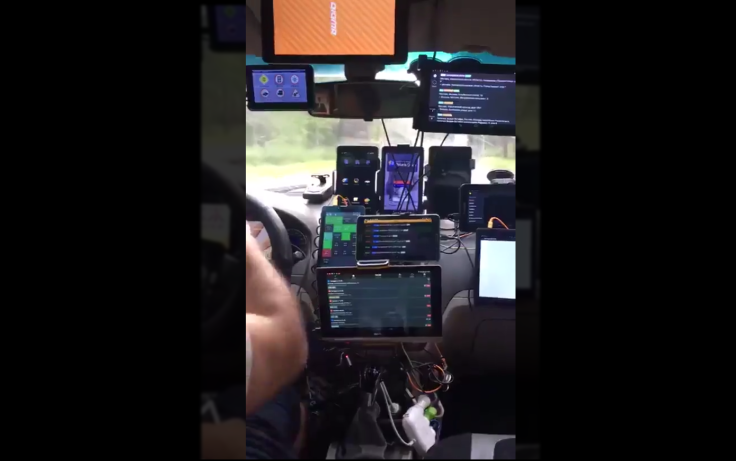Man Mines Bitcoin While Driving With Car Full Of Tablets, Smartphones

According to a video uploaded to World Star Hip Hop, one man appears to have turned his car into a mobile Bitcoin mining machine by equipping it with a mess of smartphones, tablets, and adapters to power them all.
The video, posted by a user named Abdul and titled “This Dude Is Really Out Here Mining/Trading Bitcoin While Driving,” shows the inside of a man’s vehicle where the dashboard has been taken over by about 20 mobile devices.
It’s not entirely clear from the video if all of the mobile device are actually being used for Bitcoin or cryptocurrency. Assuming they are, it’s probably not the most efficient way to mine for the digital tokens.
Mining for Bitcoins requires lending processing power from a device to be used for solving complex mathematical equations that are required to verify transactions across the blockchain—a digital ledger that keeps track of all Bitcoin activity. Users are rewarded for contributing to the verification process with Bitcoins.
According to the Digiconomist, mining for Bitcoin currently eats up about 39.84 terawatt-hours—about the same energy consumption of the entire country of Hungary. Each individual transaction eats up about 328 Kilowatt hours of energy—nearly half of the energy an average household in the United States uses in an entire month.
Not only does mining for Bitcoin require a lot of energy—something the man in the video’s car battery will likely learn the hard way—but it also requires a significant amount of processing power that most mobile devices cannot provide.
Mining rigs generally utilize a powerful CPU and GPU (graphics processing unit) to maximize mining efficiency. While smartphone chips have improved in recent years, they still lag behind what a desktop machine with its own dedicated power source can produce.
Regardless, the system still probably beats alternatives like the Kodak KashMiner, a standalone cryptocurrency mining machine that will cost consumers nearly $3,500 up front to purchase—just to have the right to split the cryptocurrency it mines with Kodak.
© Copyright IBTimes 2024. All rights reserved.





















